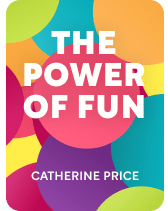

This article is an excerpt from the Shortform book guide to "The Power of Fun" by Catherine Price. Shortform has the world's best summaries and analyses of books you should be reading.
Like this article? Sign up for a free trial here.
What activities make you feel more alive? If a passion isn’t just something that you love to do, what is it?
In The Power of Fun, Catherine Price says that modern society has made it harder to prioritize fun. She shares ways to bring fun back into your life. One of these ways is to find and pursue your passions—activities that inspire and energize you.
Read more to learn Price’s advice for going after the things in life that bring real enjoyment.
Find & Pursue Your Passions
With a better understanding of what True Fun means for you, you can start prioritizing it in your life. Price explains that you don’t just start having more fun because you’ve decided to: You also need to create the conditions that are conducive to fun. To attract more fun into your life, Price recommends making time and using that time to find and pursue your passions.
If you’re going to prioritize fun, you need to make space for it to happen. The first step in making time is to give yourself permission to have fun. Then, think about how you can free up time in your day for fun. This might mean focusing on your high-impact tasks at work, saying no to obligations that aren’t necessary or fun, and setting boundaries with your phone and other devices.
Price recommends you use your reclaimed time to pursue your passions, which she defines as activities or hobbies that focus your attention and leave you feeling invigorated. Not everything you love to do is a passion. For example, you may love taking baths, but this is an activity that relaxes you, not one that inspires you; therefore it doesn’t qualify as a passion.
(Shortform note: While pursuing your passions is an excellent use of free time, you shouldn’t feel any pressure to use your leisure time productively. According to some research, many people feel pressure to maximize their leisure time by choosing the most fulfilling and enjoyable activity, which can lead to unnecessary stress. Alternatively, the pressure to maximize leisure time can lead to a performative approach where individuals prioritize external validation, societal expectations, and the appearance of a perfect leisure lifestyle over their own authentic preferences and enjoyment. Ultimately, your passion won’t be fun if the pursuit of it isn’t intrinsically motivated.)
Price explains that our passions are often a great jumping-off point for True Fun because they lend themselves to opportunities for playfulness, connection, and flow. Passions are playful because they’re voluntary and pursued for their own sake. They also often lead you to meet new people and make new connections, and they facilitate building skills and knowledge that allow you to experience flow.
(Shortform note: In The Happiness Project, Gretchen Rubin makes an important distinction between fun and passion. She explains that fun (and leisure) activities are activities you enjoy, while your passion is something you want to get better at. Unlike Price, Rubin recommends jumping into your passion by setting an ambitious goal. For example, if you’re passionate about playing music, you might commit to recording 10 songs by the end of the month. She argues that setting an ambitious goal will help you prioritize your passion, boost your confidence, and bring a new perspective to your life.)
How to Find Your Passion
If you’ve lost touch with what you’re passionate about, Price offers some guiding questions to help you get started:
- What are you interested in learning?
- What’s something you used to love but stopped doing?
- What’s something you’ve always wanted to try but never felt like you could?
- What’s something you do that lights you up?
Price recommends you brainstorm as many ideas as possible and then choose something (anything) to try. Even if it’s not the right fit, you’ll have learned something about yourself in the process.
(Shortform note: Rubin also suggests approaching a current hobby from a new angle. For example, if you paint, experiment with new materials or surfaces, or, if you’re a musician, try learning a different genre of music.)
Price cautions that many people avoid pursuing their passions because they’re afraid of looking stupid or being bad at something. She says that if you’re trying something new, you probably will be bad at it, but she offers the reassurance that, if you stick with it through the awkward beginner phase, you may discover a new passion (and a potential source of True Fun).
(Shortform note: As Price says, trying something new likely means you’ll be bad at it for a while. As such, being a beginner requires you to have an open attitude, ask questions, and be OK with making mistakes. That’s why Tom Vanderbilt, author of Beginners, argues that the willingness to be a beginner is a sign of courage, creativity, openness, and humility—something to be embraced rather than avoided.)
Exercise: Find Your Passion(s)
After making more space for fun in your life, Price recommends filling the new space with something you’re passionate about.
- If you can already identify a passion, describe it below. If you aren’t sure what your passions are, describe something you’ve always wanted to learn about or try but have never had the chance.
- What’s one thing you can do this week that empowers you to engage with your passion? (For example, you might sign up for a class, invite a friend to practice your passion with you, or talk about what you’re excited about with a close friend or family member.)
- What’s a potential barrier you anticipate to practicing your passion? Describe the barrier below and one idea about how to overcome it.

———End of Preview———
Like what you just read? Read the rest of the world's best book summary and analysis of Catherine Price's "The Power of Fun" at Shortform.
Here's what you'll find in our full The Power of Fun summary:
- Why fun is fundamental to living a happy and healthy life
- How modern society has made it harder to prioritize fun
- A step-by-step guide to invite more fun into your life






